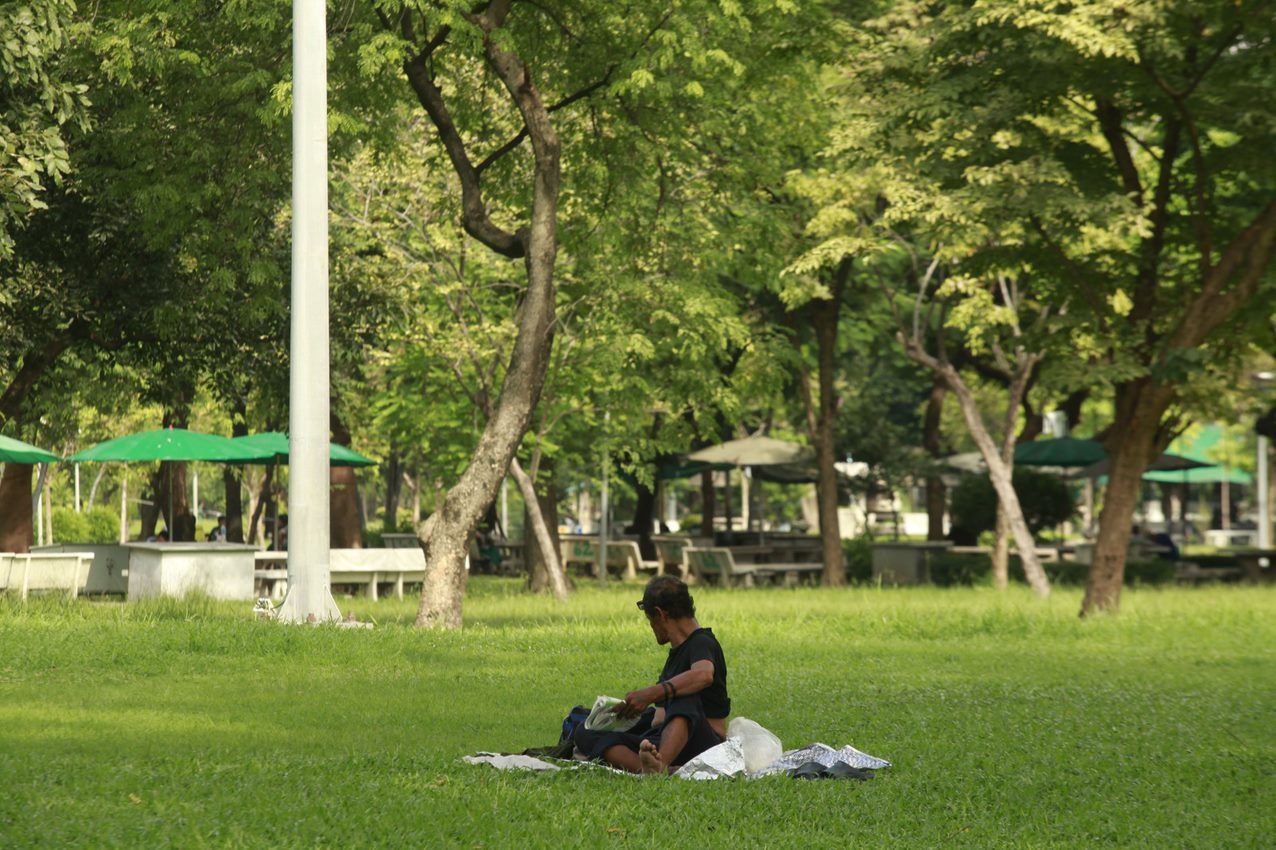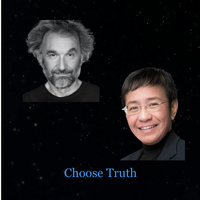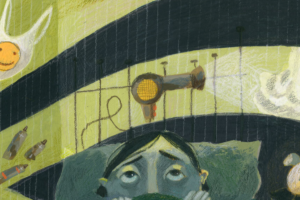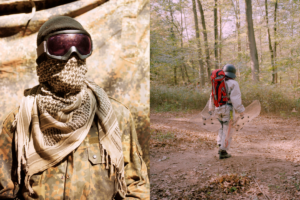At the age of 55, Piak feels as if he is a stranger in Bangkok.
He sleeps in Lumpini Park and calls the public park “home”. However, people in his “home” do not want to know him.
Before he lost his job and needed to move out of his rental accommodation, he had been working as a vendor in Bangkok’s central business area.
“I always feel as if people look through me, hardly see me exist at all. Despite the fact we share the same space, we are of different social ranks,” said Mr Piak.
Piak is one of about 90 people whom Lumpini park officials and park-goers mockingly refer to as “Lumpini Park residents”.
The park is well-known to those who love outdoor exercise and enjoy brisk walks and fresh air.
It is located on prime space, the central business area, and is surrounded by a major hospital, universities, schools, shopping complexes and swanky condominiums.
Lumpini Park’s “residents” have become a headache for the Social Development and Welfare Department (SDWD), under the Ministry of Social Development and Human Security.
The government has recently issued an order to clear the homeless from the park.
Napha Setthakon, head of the SDWD, told the Bangkok Post that the department is preparing to relocate the homeless people to a “real home”in a state-run temporary shelter.
“I don’t have enough money to rent a room. It’s all spent on food and travel expenses,”
Opponents, including university scholars, are demanding a better solution than just a change of sleeping venue.
Piak wants the government to review the plan.
“If birds and hia [water monitors] are allowed to live in the park, I should have the same right as a Thai citizen with an ID card,” Mr Piak said.
Mr Piak left his home upcountry and moved to work in Bangkok when he was 14, and claims he spends four or five days a week sleeping at the park because he wants to save money.
He is currently earning some money – 300 baht a day – selling clothes in the Sukhumvit area.
He does not want to rent and send all of his earnings back to his family upcountry. “I have to save some (money) to help support my family,” Piak said.
All of his savings go to his two daughters and their children who are studying.
Other so-called “Lumpini Park residents” also have their own reasons for being there.
Chai, an ex-worker in Bangkok who has moved to Chiang Rai, said he still needs to visit and stay in the city for days at a time because he is a patient at King Chulalongkorn Memorial Hospital, which is just opposite Lumpini Park.
His illness requires frequent appointments with his doctors. Because his medical welfare under the Social Security Fund has not yet been transferred to the hospital of his choice in Chiang Rai, he is taking shelter at the park during treatment.
“I don’t have enough money to rent a room. It’s all spent on food and travel expenses,” Chai said.
A 60-year-old woman who asked not to be named said she regularly comes to the park to take a nap during the day time. She goes along with her family, bringing a nephew to meet a doctor at King Chulalongkorn Memorial Hospital.
“So I do not mean to stay overnight at the park but only wanted to relax and take a nap while waiting for them to finish. But after a short sleep, I was suddenly woken up by officials who said the law prohibits sleeping in the park,” she said.
“I bet if foreigners or some wealthy-looking park-goers rolled out mats and fell asleep, nobody would wake them up,” she said.
Academic experts said the government’s handling of homeless people is prejudiced.
Bunloet Wisetpricha, a researcher with Thammasat University’s Faculty of Sociology and Anthropology, said officials should be trained to deal with people using public space because some of their antics such as waking people napping on benches or asking people with destitute looks to move on displays bias.
“Low-income earners should enjoy the same right to relax and even lie on the lawn for a short sleep after working hard during the day,” he said, warning that officials should “not worsen their problems and close off their opportunities.”
The SDWD insisted it wants to help those 40 homeless people and 55 others who are using Lumpini Park for eating, bathing and taking naps.
“If birds and hia [water monitors] are allowed to live in the park, I should have the same right as a Thai citizen with an ID card,”
This group at Lumpini Park is among 897 people defined as “Wanderers of Bangkok”, according to a department survey this month.
Its latest effort to bring them to the state shelter came after Prime Minister Prayut Chan-o-cha visited the park early this month.
Park-goers gave him an earful of complaints during his visit about homeless people.
“Some view these (homeless) people as a disturbance while other visitors are worried about their safety,” Napha said.
“Over 50% of homeless people suffer from mental illness,”added Naphna. “These people would be sent to a state shelter in the Huay Kwang area of Bangkok”.
“The department will not only give them a place to live, but it also helps them reunite with their families and give medical treatment to those in need,” she said.
Mr Bunloet, known as an expert on the homeless issue, said the measures to return these homeless to their families or provide them shelter and welfare are acceptable.
“The social ministry needs to join forces with civic groups, especially City Hall and district officials and social workers to ensure long-term results,” he said.
Among the challenges is resistance from the targeted group.
“Homeless people usually oppose relocation to places far from areas they are familiar with,” he said.
The government needs to find the “right place” for shelters and make sure they are well-run and habitable.
Mr Bunloet said the first thing the government can do is to change the language it deploys. He warned officials not to use words such as “regulate”.
“It sounds like these people are linked with something untidy… something we need to get rid of, rather than help,” he said.
This story by Penchan Charoensuthipan was first published by The Bangkok Post on October 28, 2018.
BEHIND THE STORY
In late 2017, the Ministry of Social Development and Human Security issued an order to clear a number of homeless from Lumpini Park who slept at the park and took baths at the park’s toilets. The ministry pledged to relocate them to a new home at a state-run temporary shelter. After the ministry’s order was announced, The Bangkok Post decided to investigate further on the situation of the homeless of Lumpini Park and allow readers to understand their plight in the capital. The paper aimed to examine the ministry’s actions to tackle the problems as well as give a voice to the voiceless. After the story was published, the ministry’s attempts to relocate the homeless to the shelter was monitored closely and a survey of the homeless who remained in the park was taken. Whilst some had decided to stay at the temporary shelters, a majority opted to stay and spend their life at the park despite having to escape the authorities.




